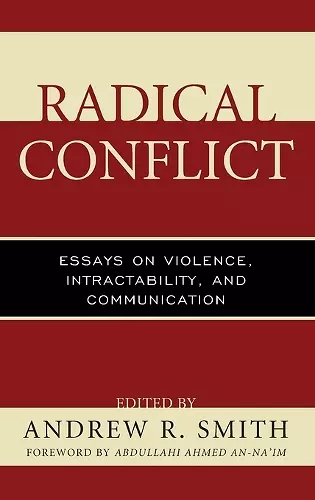Radical Conflict
Essays on Violence, Intractability, and Communication
Format:Hardback
Publisher:Bloomsbury Publishing PLC
Published:5th May '16
Currently unavailable, and unfortunately no date known when it will be back

Radical Conflictaddresses conflict at interpersonal and communal, legal and rhetorical, ethnopolitical, global, and geopolitical levels. The conflicts analyzed are "radical" because in each some intense and often prolonged violence takes place. The chapters address different kinds of violence(s)—physical and gratuitous, structural and socio-economic, legal and symbolic, all with significant ill effects and injustices that spiral in all directions. All share an interest in exploring imaginatively and speculatively what can be done to attenuate such cycles of violence. The volume analyzes how recurrent narratives, mythologies, media(ted) constructions and other discourse(s) of liberal democratic and authoritarian states play a significant role in exacerbating or thwarting violence, exposing, escalating, legitimizing, rationalizing, propagating, but also possibly mitigating violence in all of its forms.
Each contributor provides a critical interpretation of the status of the conflict under inquiry, including: a teacher verbally abusing and ridiculing a student then exposing it in social media; a community torn apart by environmental disaster; the incommensurate but not incommensurable conflict between Israelis and Palestinians; the Muslim Brotherhood and the militarized state(s) of Egypt and Libya; urban discourses in cyberspace among Moroccan and Maghreb youth that have become counter-signifying publics against oppression of the state; the role of media and violence in Zimbabwe's political struggle; the impact of the Circassian diaspora in global politics especially in the United States; India's soft power approach to the Kashmir conflict as a way to capitalize on it through tourism; the agonistic discourses that pervade the conflict over the Sahara and deprive Sahrawi people of rights; and how the liberal state is implicated in the gratuitous violence of ISIL.
The volume also offers a section on the rhetoric of exclusionary laws associated with intractable conflicts of the abortion conflict, the right to die controversy, and a Burkean perspective on violence in Bangladesh. Contributors suggest what can be done conceptually and politically to mitigate and end violations of those who are most vulnerable, banished, forgotten, damaged, and often silenced.
These essays on violence, intractability, and communication are uniformly of high quality, finely written, and sharply focused. Moreover, this collection adds up to more than the sum of its parts. These essays intersect with one another in complex, suggestive, and illuminating ways. . . . It would of course be impossible to do justice in a review such as this to even one of these clusters of essays, let alone to all four. In a world in which radical conflicts of an increasingly violent character is one of its most salient features, the critical and imaginative attention of such a diverse group of scholars and activists is especially welcome. This volume deserves to be read widely and carefully. It would be hard to identify a more pressing concern than that of how to sustain mediations between (or among) parties whose self-determination so quickly and compulsively drives in the direction of exterminating, violating, ridiculing, denigrating, and in dehumanizing the rivals of these parties. It is impossible for me to think of a volume that more directly, forcefully, and insightfully addresses this concern in both its basic structures and some of its most telling contemporary instantiations. . . . Imagine a volume in which scholars ranging from emeriti to graduate students, hailing from Africa (with a strong representation of scholars from Morocco), Canada, Scotland, Russia, and the United States, with interests ranging from local, regional, national, and global conflicts in their cultural and historical specificity to theories, critiques, discourses, and historiography of radical conflicts and the communicative practices designed to address these intractable struggles. There is, however, no need to imagine such a volume. Andrew R. Smith has relieved us of this by assembling a chorus of voices, at once singular in their mode of expression and conjoined in their morally animated engagement with what is one of the most pressing contemporary issues (How can we effectively address at various levels, from the most immediate and intimate to the global, intractable conflicts, especially address such conflicts in such a way as to break or, at least, attenuate the link between such conflicts and violence?). It is not an exaggeration to claim that all other major contemporary issues are bound up with this one. * Russian Journal of Communication *
Radical Conflict is an interesting, timely, and essential edited collection. It is a notable contribution to the collective understanding of peace and conflict, showcasing the need for ongoing recollection, reflection, and interpretation that can result in thoughtful and imaginative solutions. The essays in this collection help readers understand radical and intractable conflict not as insurmountable problems but rather as issues that can be addressed through deeper understanding, and through the building and maintenance of faith, hope, and trust. It is a valuable contribution to the field. -- Laura Finley, Barry University
Radical Conflict: Essays on Violence, Intractability, and Communication meets contentiousness and passionate intentions with creative, thoughtful, and pragmatic suggestions situated within tenacious hope. Andrew Smith's volume addresses impossible conflict and the necessity of the human spirit in addressing the possibilities of difference grounded in the pursuit of pragmatically-shared self-interest. -- Ronald C. Arnett, Duquesne University
This timely, wide-ranging, and ambitious collection provides a theoretically rich yet empirically grounded critique of how we think about and do conflict resolution in a world of increasingly complex and resilient forms of mass violence—corporeal, institutional, epistemic, and otherwise. The application of a common methodology allows each chapter to reconstitute and analyze the essential discourses of the case in question. In so doing, this volume successfully elucidates new horizons of understanding and action. -- Jacob Mundy
ISBN: 9781498521772
Dimensions: 236mm x 165mm x 31mm
Weight: 630g
326 pages